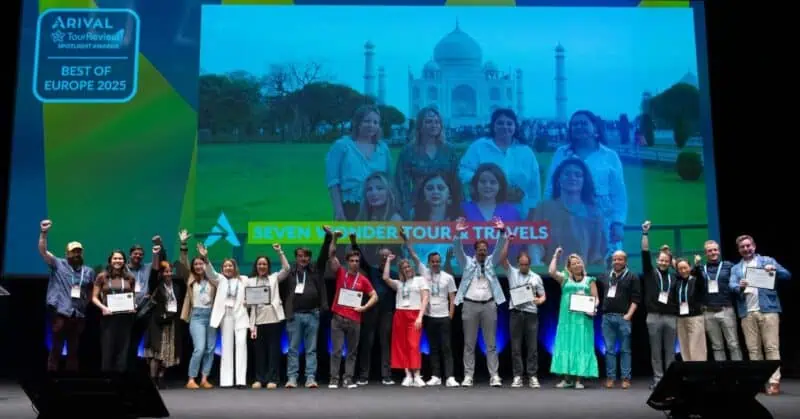The world of travel experiences is evolving quickly, and staying ahead of emerging trends is crucial for tour operators who want to remain competitive and thrive in the growing “things to do” travel sector.
As the experiences sector itself gains momentum, the wider industry is taking notice, and more players are entering the fray. This means more supply, more online travel agency (OTA) listings, and more competition. For operators, it’s essential to stay on top of the evolving trends and themes in order to differentiate yourself in an increasingly crowded marketplace.
So, with data insights from Arival and industry discussions highlighted in the Travel Trends podcast, we’ve identified five key trends shaping the future of tourism as we move into 2025.
This trend discussion doesn’t just highlight what’s new—it offers actionable takeaways to help tour, activity and attraction operators leverage these changes for growth.
The Method Behind the Trends
To understand the evolving landscape of tours, activities, and attractions, we revisited the key tourism trends from 2023 and 2024, comparing these with recent Arival research on the Global Operator Landscape and the Experiences Traveler, and with the hot topics discussed by industry leaders at the latest Arival events, and on the Travel Trends podcast, which is finishing their fourth season.
Trends such as AI in travel, the rise of short-form video, and immersive travel experiences have demonstrated significant growth, alongside broader challenges like overtourism and sustainability.
For tour, activity and attraction operators, the expanding focus on experiences over material goods is an opportunity, but one that requires a sharper understanding of today’s traveler habits. Read on for the five trends emerging in 2025—and why they matter to your business.
27-29 April 2026
Insider Pro Access Members Save 20%
THE event of the year for the European in-destination experiences industry
Get Your Super Early Bird Ticket through 15 July!
Top Five Trends in Travel Experiences for 2025
1. The AI-Powered Operator
Artificial intelligence (AI) continues to impact the travel and tourism industry. From streamlining operational processes and accelerating content creation to powering guest communication, AI tools are becoming must-haves for any business. Operators that learn to leverage these tools will gain a huge advantage. However, many tour and activity operators are behind on AI: only 12 percent of operators surveyed in 2024 saying they’re actively using it in their business.
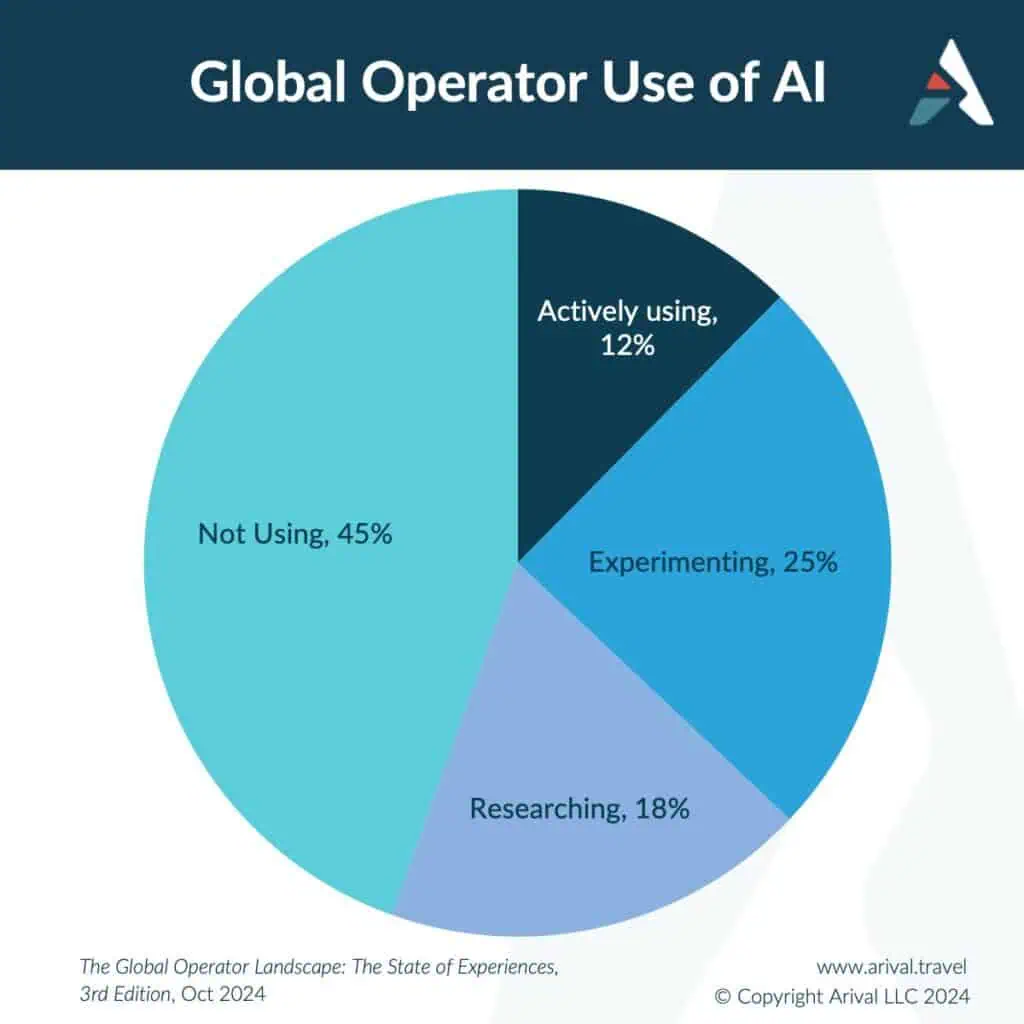
Among those operators currently using AI, here are the most common uses already:
- Generating product, marketing copy and content, blog posts and social media content;
- Customer service support, including chatbots for customer service;
- Online review tracking and management;
- Gen AI to support internal operations, including support in creating marketing and business plans, internal documents and manuals, and other resources.
What’s the leading edge:
- Online Booking & Dynamic Pricing: AI tools for operators are being used to help streamline the booking process as well as enable AI-powered dynamic pricing. For example, the winner of Arival’s latest Experiences Innovation Showcase, online booking system Peek, is now offering AI pricing, which gives operators the ability to adjust their pricing in real time based on recommendations from data ingested and analyzed by the AI.
- Content Creation & AI Search Optimization: While content creation was one of the most natural first applications for generative AI with the release of ChatGPT in late 2022, with tools for tour description optimization, for example, the ability for travelers to use AI in search has also introduced the challenge of how to get found online, not only by travelers, but also by the AI tools travelers are using.
- Guest Communication & Review Generation: AI-powered software can assist operators with guest communication, taking things a step above basic chatbots via companies including TOMIS Tech and TourOptima (the latter, formerly Curated Planet, was the winner at the first Arival Experiences Innovation Showcase. Tools like TripAdmit’s TipDirect also give operators the ability to offer their guests AI-assisted review generation in the post-trip communication process.
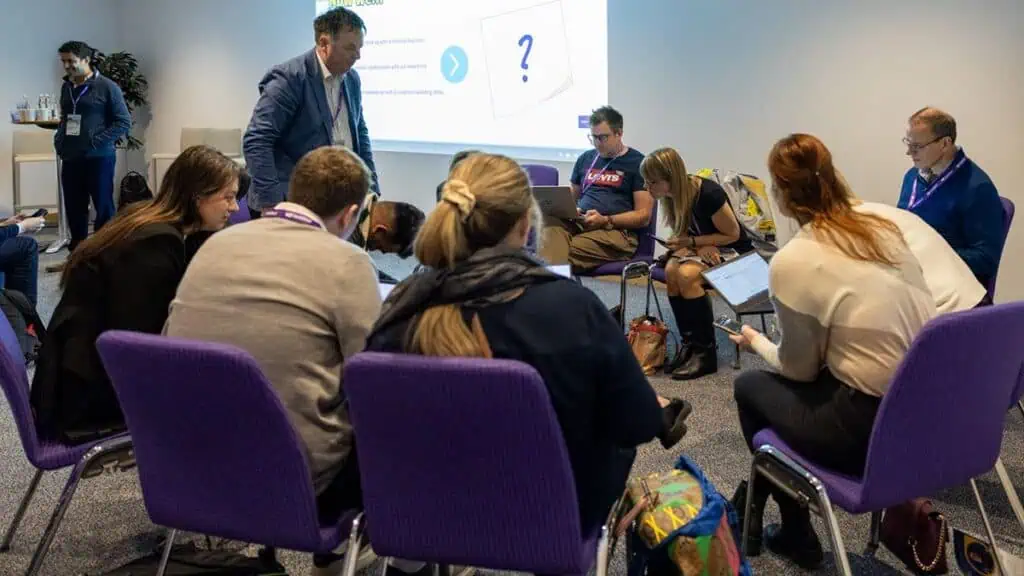
Takeaway for Operators: Using AI in Your Business
The implementation of AI in your business doesn’t have to be daunting. Start small by exploring tools that can optimize your operations, such as chatbots for customer service or AI tools for creating engaging marketing content. Ignoring AI is no longer an option, as this technology is shaping traveler expectations across every touchpoint. Check out Arival’s Guide to AI in Experiences, explore ways experience businesses are using AI today, and learn how to optimize your experience product listings for generative AI search.
2. Social Video is the New Search
Did you know that over half of Gen Zs and Millennials now actively use platforms like TikTok or Instagram Reels to discover travel experiences? And not just discover — platforms like TikTok are now testing functionality for users to book travel products directly through the app, and Google’s grip on the search market is slipping as advertisers look elsewhere to reach their target markets. Short-form video has grown beyond just entertainment—it’s now a key component of social commerce.
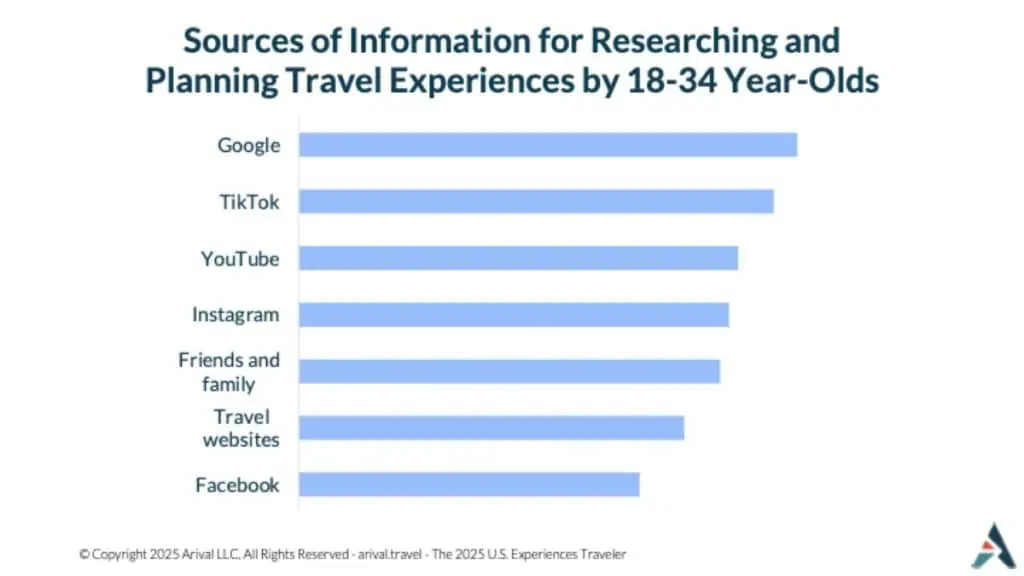
- Traveler Discovery: Arival’s research shows that consumers — younger (18-34-year-old) travelers in particular — are increasingly bypassing search engines in favor of social media, with vertical video content driving this shift. Younger travelers’ use of TikTok is now in a statistical dead heat with Google.
- Social Commerce Integration: Platforms like TikTok, now integrated with booking tools like Klook, are creating a seamless user experience where inspiration leads to instant purchase.
- UGC’s Big Moment: User-generated content (UGC) is amplifying its role in travel marketing. Apps like NaviSavi are connecting operators with content creators, allowing them to showcase their experiences authentically, and it’s working: a recent trial demonstrated travel-themed UGC used in travel marketing campaigns got nine times more click throughs than professional video content.
Takeaway for Operators: Social Video is the Key
Investing in short-form video content is an investment in the future. Engage professional creators or encourage your customers to share their experiences using hashtags connected to your business. Bonus tip—optimize your TikTok and Instagram profiles with links that allow instant booking. Learn more about measuring influencer engagement, explore TikTok and Instagram strategies, and check out Arival’s Ultimate Social Media Guide for Tour Operators.
3. OTAs Accelerate – and More Enter the Fray
OTAs – online travel agencies – have been the biggest growth story in our industry over the past several years. Their share of operator bookings has risen significantly from 24% in 2019 to 33% in 2024, according to Arival’s Global Operator Landscape (3rd Ed.) The State of Experiences report.
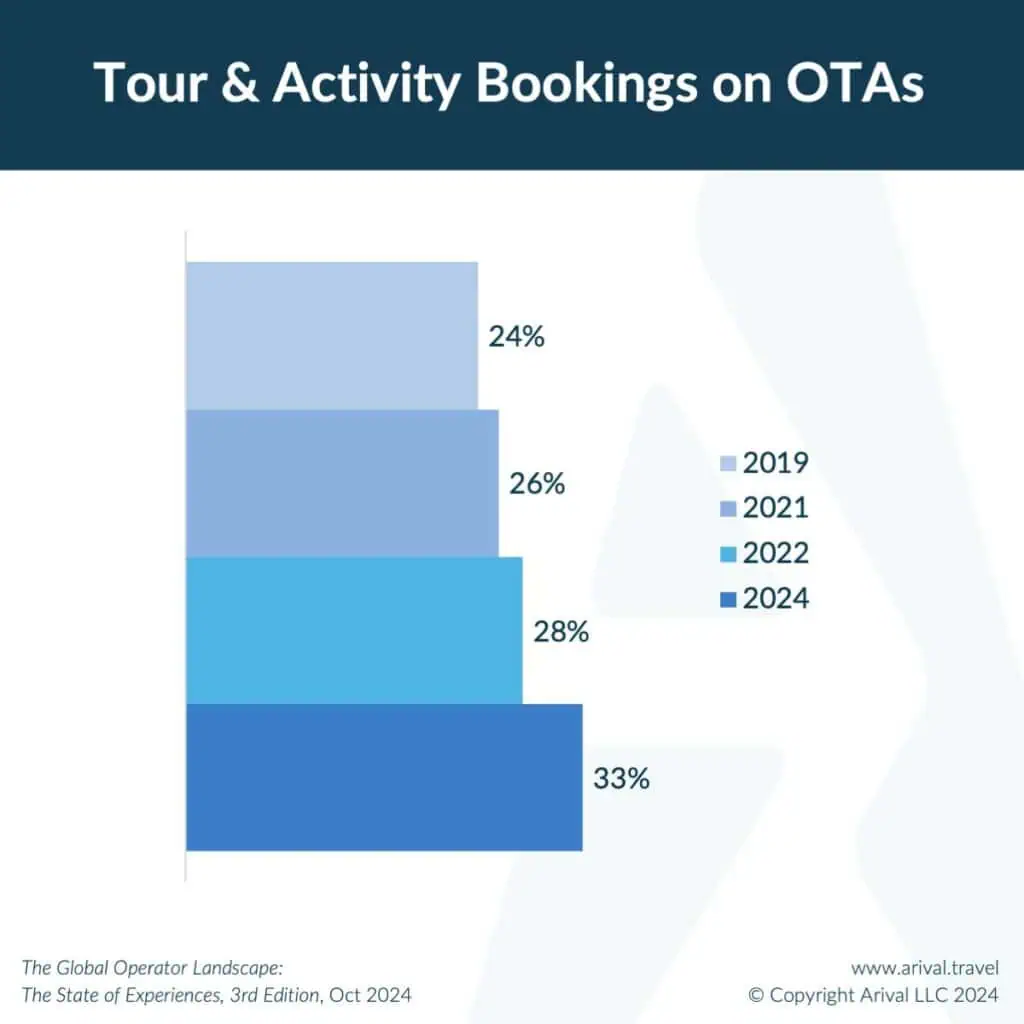
The big three OTAs – Viator, GetYourGuide and Klook – get most of the attention and media coverage in our industry. But they are hardly the only game around, and several up-and-comers are rapidly gaining share. Civitatis is intent on expanding beyond its core Spanish-speaking markets after raising $50 million in 2024. KKday just announced an additional $70 million infusion as it seeks to take on Klook and others in North Asia. Headout has been quietly and rapidly advancing across Europe and the U.S., and the list goes on… and on.
Not only will this continue, but the OTA space will only become more competitive. The broader travel industry, including online travel agencies for hotels and flights, as well as hotel brands, credit card companies and other organizations seek to capitalize on the travel experiences opportunity. Airbnb has already announced its plans to re-enter the market significantly in 2025, and more will follow. Expect some big travel brands to seek major inroads into tours, activities and attractions in the year ahead.
Takeaway for Operators: Use OTAs to Grow Sales
We know all too well OTAs can be a source of anxiety for some operators, as their share of bookings and influence on the market grows. But we believe the rise of more platforms is a good thing for operators. More OTAs means more competition, not just for customers, but for tour, activity and attraction supply. This also means more channels and potential partners for operators to grow their sales.
Learn more about working with OTAs with this essential OTA checklist for operators, explore these alternative distribution methods beyond OTAs, and download our Guide to OTAs & Digital Distributors, which includes a comprehensive directory of OTAs and online resellers for operators of tours, activities and attractions.

4. (Over) Tourism Management Gets Real: Ticket Access & The Destination Shift
The “overtourism trend” is hardly new, but the growing response from local governments and communities is now directly affecting operators’ ability to grow and deliver a great experience to their guests. Some specific examples of these impacts include:
- The implementation of ticketing systems at key points of interest such as the Acropolis and Trevi Fountain,
- Prague and Amsterdam banning pedal pub tours,
- Limits to tour group sizes within popular destinations like Venice and Barcelona.
Some of the broader impacts of overtourism are leading to wider changes in the industry:
- The ability for operators to access attraction tickets. Overtourism in popular destinations in Europe in particular is causing some attractions to adjust and limit their ticketing processes, which adds to the challenges for operators who rely on attraction tickets as part of their tours and other experience product offerings.
- The destination shift: While overtourism is a challenge for destinations and operators, it can also negatively impact the traveler experience, and many travelers are increasingly avoiding overtouristed destinations by seeking out under-the-radar locales. In 2024, booking data showed an increase in interest in alternative destinations as travelers seek to escape the heat, the crowds, and the high prices. For 2025 this trend continues, as emerging destinations rise in popularity, and savvy operators start or expand their tour businesses to take advantage of the shift. See some examples of these rising destinations below.
The Destination Shift
| Asia Pacific: Asia Pacific in general is expected to drive growth in the next few years. The Philippines in particular is expected to grow: One Life Adventures successfully launched in the Philippines several years ago and now many major group tour companies are seeking a way to expand offerings to this region. | Europe: Albania, known for its pristine coastal towns and rugged mountains, this gem in the Balkans appeals to travelers who want Europe without the crowds, and has been cited as a “destination dupe” for Greece or the Maldives. |
| LATAM: Colombia is seeing growing interest globally as a trending experiential destination. The Travel Trends podcast recorded live in Colombia in October and will be launching a destination feature on Colombia early in 2025 and continuing to cover emerging destinations in season five. | U.S.: Maryland, the state which borders Washington D.C., is the fastest-growing travel destination in the U.S. for experiences on Viator, according to the OTA’s year in review report. Maryland/D.C. also happens to be the location of Arival’s 2025 U.S. event! |
Takeaway for Operators: Adapt and Expand
As the experiences sector grows, “overtourism” will naturally continue to be a challenge, but savvy operators will find ways to adapt. Learn more about attraction access for tour operators here, and join us at the next Arival event in Valencia, where overtourism, and adapting to its challenges, will be a major focus of discussion.
If your business is tied to a specific region, consider creating tours or packages that tap into emerging destination appeal. Leverage their growing popularity by crafting marketing messages that celebrate their authenticity and connection to local culture. If you’re looking to grow or expand, explore these strategies for scaling and learn how one tour operator used AI to scale and expand their destination footprint.
30 September – 3 October 2025
Insider Pro Access Members Save 20%
THE event of the year for solutions-focused In-Destination Experience creators and sellers
Get Your Spring Savings Ticket Today!
5. What (Affluent) Travelers Want: Private, Immersive & Community-Focused Tourism
By far one of the most significant shifts we observed in Arival research over the past year has been the rise of the affluent traveler, and the impact of their spending power on the experiences sector – for example, by prompting an increased demand for private tours.
Younger affluent travelers in particular are driving a shift towards experiences-first travel, as they are almost twice as likely as all other travelers to say that their decision where to go is based largely or primarily on the experiences they wanted to do, Arival’s Affluent Experiences Traveler report found.
Affluent travelers aren’t the only ones who increasingly value experiences: travel in general is shifting from checking destinations off a bucket list to embracing shared experiences. More people are turning to immersive, interactive group tours that focus on community and fostering human connection. These trips allow travelers to explore together while supporting local cultures and creating meaningful, value-driven experiences. Multi-day tour operators in particular are planning for growth: Intrepid, for example, is planning to double their guests by 2030.
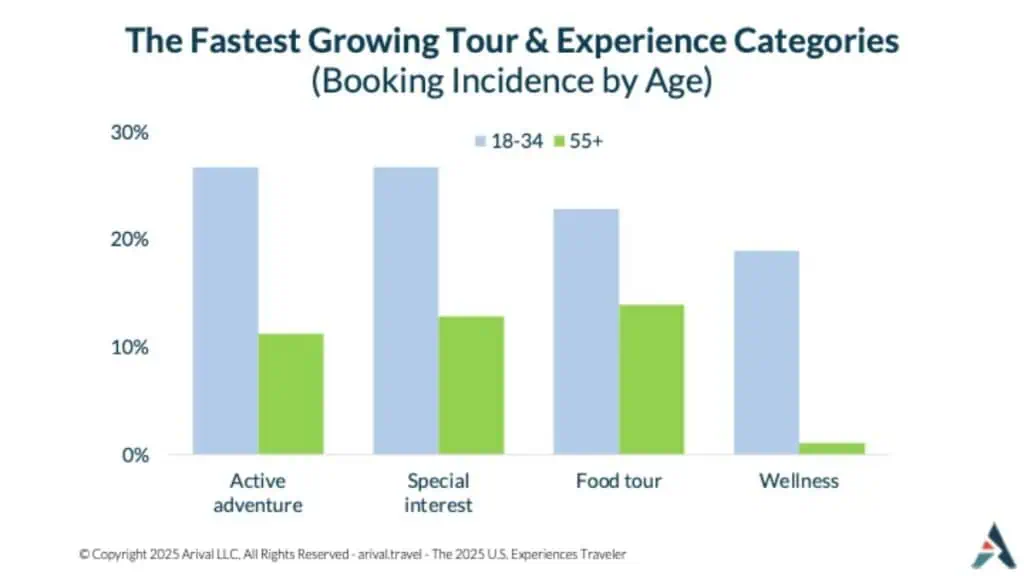
Here are some of the experiences that travelers in general, and affluent travelers in particular, are looking for in 2025:
- Private Tours & VIP Experiences: More operators are offering private and custom tours, and more attractions are offering VIP experiences to enhance their offerings, as demand for these types of experiences increases. For travelers, the biggest driver for private tours is the demand to have an exclusive, controlled experience with their family or travel group, according to Arival’s 2024 report on The Private Tour Taker. Beyond individual travelers, some companies are getting on board as well, and corporate group tours are becoming more popular.
- Community-Driven Tourism: “Tour or experience with a local” was the second most popular tour type for 55+ travelers (after “sightseeing), according to Arival’s consumer research. Companies like WeRoad offer curated group tours with a focus on creating meaningful human connections, and operators like Invisible Cities offer a unique opportunity to connect with a local guide who has experienced homelessness.
- Special Interest, Niche Travel: “Special interest tours” are among the fastest-growing tour and experience categories for younger travelers in particular. Tour agencies and operators specializing in unique offerings like women-only trips or photography-specific tours are growing rapidly. Intrepid Travel is now offering women-only group tours, for example, and Flytographer offers travelers the opportunity to book a photographer for a portion of their trip. Fans of everything from Outlander to Taylor Swift can find attractions, tours and experiences tailored to their interests.
- Countering Tech Fatigue: While AI is on the rise, so is the hunger for adventures that take you away from it all. “Active Adventure” is another fastest-growing category among younger travelers, as some travelers are deliberately choosing more human-centered, offline travel experiences—seeking deeper connections with culture, people and nature. According to Shannon Stowell of the Adventure Travel Trade Association (ATTA), some resorts are limiting wifi to the lobby area and keeping it away from the dining areas to ensure interaction and off the grid experiences, as referenced in this Travel Trends episode on adventure travel.
Takeaway for Operators: Give Travelers What They Want
Affluent travelers are driving a shift towards more private and VIP experiences, more immersive and community-focused tours, experiences that appeal to their interests and foster authentic human connection. Learn more about attracting the affluent traveler in this report.
Affluent travelers may have the resources to drive the shift, but they’re not the only ones seeking out more meaningful travel experiences. Building purpose into your tours can elevate your brand and help you differentiate yourself amid the increasingly competitive landscape in 2025. Whether through sustainability initiatives, supporting local communities, or designing experiences for special interest, niche audiences, showcasing the “why” behind your options and emphasizing the human connections built into your experiences will appeal to today’s conscious (and in many cases, tech-fatigued) travelers.
Position Yourself for Success in 2025
The trends shaping travel and experiences in 2025 open up new possibilities—and present challenges—for tour operators. AI can elevate the efficiency and reach of your business. Short-form video and social platforms amplify your storytelling and attract new audiences. Working with online travel agencies can expand your reach. Overtourism can prompt a change in strategy that will help you grow and potentially open doors to entirely new audiences. The rise of the affluent traveler presents an opportunity for companies to increase profitability by focusing on private and VIP, community-oriented, and/or special interest tours and experiences.
Take the opportunity to reflect on these shifts and incorporate at least one into your strategy for the coming year. Staying agile and understanding your audience will ensure your business thrives in the evolving tourism landscape.
Bonus: What’s the Best Way to Stay Ahead of the Trends?
Besides reading the Arival newsletter? Podcasts. The number of travel industry experiences who have launched podcasts to help all of us stay ahead of the curve has surged. There’s now more listening options than offer for industry professionals like you who want in-depth content and inspiration on the go. While podcasts have of course been around for awhile, they are becoming increasingly relevant in the travel industry, and a growing number of podcasts have entered the scene to specifically highlight the experiences sector of travel.
- The Rise of Video Podcasts: Just as travelers are increasingly preferring video in the search and discovery phase of travel planning, platforms like YouTube are overtaking Spotify as the platform of choice for podcasts (or “vodcasts”), blending audio and visual storytelling.
- Tours, Activities and Experiences-Specific Content: Podcasts like Arival’s The Voice of Experiences, Travel Trends, and Experience This! Travel are bringing value to travel industry audiences, offering insider tips, destination inspiration, and detailed insights into the tourism sector. Other podcasts speak to specific niches or areas within travel, such as the Awkward Watersports Guys podcast, the 85 Percent podcast which focuses on women in travel, the Get Up and Scale podcast by Kai Kaapro and Justin Buzzi,The Travel Marketing Podcast with Propellic’s Brennen Bliss, and the Tourpreneur podcast.
Takeaway for Operators: Keep Ahead of the Curve with Podcasts
Add podcasts to your repertoire to deepen your knowledge and keep up with the latest travel-related conversations, and consider partnering with relevant creators in the travel podcast space or create your own branded podcast. Podcasts are an incredibly powerful medium to raise brand awareness, share your stories and even highlight testimonials from past customers. You can also repurpose content from their engagements into video snippets for platforms like YouTube and Instagram.
What’s Next? Keep up on the latest developments in travel experiences by signing up for the Arival newsletter (below), following The Voice of Experiences and Travel Trends podcasts, and joining us for an upcoming Arival event to get the first look at the latest consumer research, hear from industry experts, and connect with fellow operators and travel experiences sector professionals.
About the Authors:
Dan Christian is the Founder & Host of the globally acclaimed Travel Trends Podcast and the CEO of Acceleration Team, a leading advisory firm dedicated to helping travel brands and startups to scale. A sought-after speaker, Dan has delivered impactful presentations at Arival events, including a keynote on the future of experience discovery.
Janelle Visser is Arival’s Managing Editor and the Co-host of The Voice of Experiences podcast. She has a background in tour guiding, tour guide training and tourism management, and served as Emcee Extraordinaire for the recent Arival events in Edinburgh and San Diego.
Become an Insider Pro Access member today and get access to the full library of Arival research, plus many other benefits such as free consulting sessions, special discounts and 20% off in-person events, starting from $179 per year.
Sign up to receive insights tailored for the in-destination industry as well as updates on Arival.








